
The Last Supper is the final meal that, in the Gospel accounts, Jesus shared with his Apostles in Jerusalem before his crucifixion. The Last Supper is commemorated by Christians especially on Maundy Thursday. The Last Supper provides the scriptural basis for the Eucharist, also known as "Holy Communion" or "The Lord's Supper".
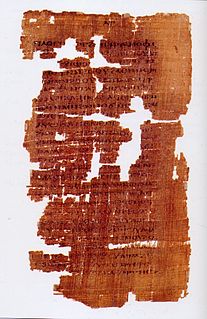
The Gnostic Apocalypse of Peter is a text found amongst the Nag Hammadi library, and part of the New Testament apocrypha. Like the vast majority of texts in the Nag Hammadi collection, it is heavily gnostic. It was probably written around 100-200 AD. Since the only known copy is written in Coptic, it is also known as the Coptic Apocalypse of Peter.

The criterion of embarrassment is a type of critical analysis in which an account likely to be embarrassing to its author is presumed to be true as the author would have no reason to invent an account which might embarrass him or her. Certain Biblical scholars have used this as a metric for assessing whether the New Testament's accounts of Jesus' actions and words are historically probable.
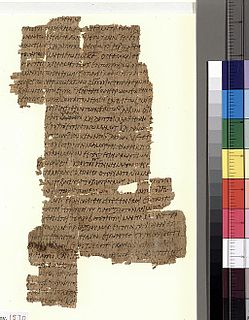
Matthew 26 is the 26th chapter of the Gospel of Matthew, part of the New Testament. This chapter covers the beginning of the passion narrative, which continues to chapter 28, containing the narratives of the Jewish leaders' plot to kill Jesus, Judas Iscariot's agreement to betray Jesus to Caiphas, the Last Supper with the Twelve apostles and institution of the Eucharist, the agony in the garden of Gethsemane and the subsequent vindication of Jesus' predictions that one of the twelve will betray him and that he will be disowned by Peter.
Self-denial is an act of letting go of the self as with altruistic abstinence – the willingness to forgo personal pleasures or undergo personal trials in the pursuit of the increased good of another. Various religions and cultures take differing views of self-denial, some considering it a positive trait and others considering it a negative one. According to some Protestants, self-denial is considered a superhuman virtue only obtainable through Jesus. Some critics of self-denial suggest that self-denial can lead to self-hatred.

In Christianity, the Confession of Peter refers to an episode in the New Testament in which the Apostle Peter proclaims Jesus to be the Christ. The proclamation is described in the three Synoptic Gospels: Matthew 16:13-20, Mark 8:27–30 and Luke 9:18–20. Specifically, Peter declares, "You are the Christ, the Son of the living God."
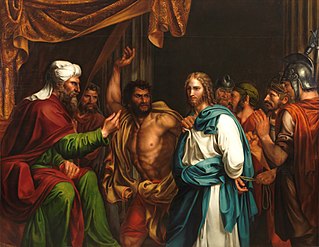
In the New Testament, the Sanhedrin trial of Jesus refers to the trial of Jesus before the Sanhedrin following his arrest in Jerusalem and prior to his dispensation by Pontius Pilate. It is an event reported by all four canonical gospels of the New Testament, although John's Gospel does not explicitly mention a Sanhedrin trial in this context.
The issue of the crucifixion, death and resurrection of Jesus (Isa) is rejected by most Muslims, but similar to Christians they believe that Jesus ascended to heaven and will return before the end of time. Most Muslims believe Jesus was not crucified, but was raised bodily to heaven by God. The general Islamic view supporting the denial of crucifixion was possibly influenced by Manichaenism (Docetism), which holds that someone else was crucified instead of Jesus, while concluding that Jesus will return during the end-times.
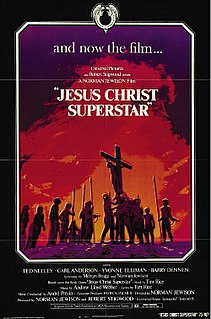
Jesus Christ Superstar is a 1973 American musical drama film directed by Norman Jewison and co-written by Jewison and Melvyn Bragg based on the Andrew Lloyd Webber/Tim Rice rock opera of the same name. The film, featuring a cast of Ted Neeley, Carl Anderson, Yvonne Elliman, Barry Dennen, Bob Bingham, and Kurt Yaghjian, centers on the conflict between Judas and Jesus during the week before the crucifixion of Jesus.
Denial is an assertion that an allegation is not true, or a psychological defense mechanism.

"I Dream of Jesus" is the second episode in the seventh season of the American animated television series Family Guy. It originally aired on Fox in the United States on October 5, 2008. In the episode, Peter finds Jesus Christ working at a record shop, and convinces Jesus to make his second coming.

The Denial of Peter refers to three acts of denial of Jesus by the Apostle Peter as described in all four Gospels of the New Testament.

Saint Peter, also known as Simon Peter, Simeon, Simon, or Cephas, was one of the Twelve Apostles of Jesus Christ, and the first leader of the early Church.

Die Leugnung der Geschichtlichkeit Jesu in Vergangenheit und Gegenwart was a 1926 book in German by Arthur Drews on Christ myth theory.
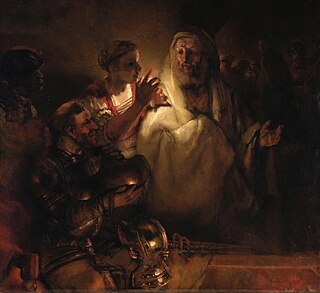
The Denial of Peter is a 1660 painting by Rembrandt, now in the Rijksmuseum in Amsterdam. It depicts the denial of Peter, an event in the Passion of Jesus.

The Restoration of Peter is an incident described in John 21 of the New Testament in which Jesus appeared to his disciples after his resurrection, and spoke to Peter in particular. Jesus restored Peter to fellowship after Peter had previously denied him, and told Peter to feed Jesus' sheep.
"The Student" is a short story by Anton Chekhov first published on April 16, 1894, in the newspaper Russkie Vedomosti. It tells of a clerical student returning home on a cold Good Friday evening who stops at a fire and meets two widows. He recounts to them the canonical Gospels' story of the Denial of Peter and upon finishing, notes that the two women are deeply moved, leading him to conclude that all of history is connected through truth and beauty.














